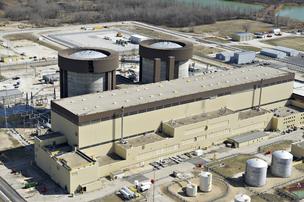Bloomberg
Exelon Corp.'s Braidwood Generating Station nuclear power plant stands in Braceville, Ill.
- StaffChicago Business Journal
While many energy companies have sold off power plants to battle declining electricity prices, Commonweath Edison parent Exelon Corp. is still hedging its bets on nuclear energy to power its growth.
The Chicago company, which is one of the nation's largest operators of nuclear power plants, said last month it was deferring plans to spend $2.3 billion on expanding capacity at its nuclear power plants and other projects because of low natural gas prices and slowed electricity demand. But this week it got a step closer to its scaled back goal of adding more than 1,100 megawatts of carbon-free energy by 2021.
The U.S. Nuclear Regulatory Commissionearlier this week accepted the company's application to modify its Peach Bottom nuclear plant in Pennsylvania to increase the plant’s capacity by 12.4 percent,Reuters said. The two reactors at the plant currently have a capacity of 1,122 megawatts, enough to power more than 1 million homes.
The power expansion application for the Peach Bottom plant will now undergo a standard 18-month review. Exelon (NYSE: EXC) initially submitted the application in September but had to resubmit after the NRC requested more information.
Exelon in previous years has aimed to increase the output of several reactors by a smaller 1.6 percent, including those in Byron, Braidwood, and LaSalle in Illinois and Limerick in Pennsylvania, Reuters said, citing the NRC website. Last year, the NRC put the review of the Byron and Braidwood on hold for more information. Meanwhile, poor market conditions forced Exelon to adjust its uprate program and postpone modifications to Limerick.
Earnings at many power companies, including Exelon, have been hit by lower energy prices, pressured by a decline in natural gas prices to their lowest level in over a decade. Coupled with the expense of complying with federal safety and environmental standards, those market pressures have forced some companies to close older coal-fired plants and scrap plans to build nuclear plants.
On Thursday, Ameren Corp. sold the unit that operates its five coal-fired power plants in Illinois to Dynegy Inc. (NYSE: DYN) in a deal worth $900 million, citing weaker power prices. Houston-based Dynegy formed a new subsidiary, Illinois Power Holdings, to buy the Ameren assets, which will double Dynegy’s generating capacity in Illinois.
But as an indication of how tight cash is across the energy sector, the $900 million value of the deal wasn’t in cash but $825 million worth of debt held by Ameren Energy Generating Co. Another $180 million comes from tax benefits Ameren expects to realize in 2015, partially offset by transaction-related costs and liabilities. At the same time, Ameren will pay at least $133 million to buy back three natural gas-fired plants from the Genco unit it's selling.
"We expect that this transaction will reduce business risk and improve the predictability of our future earnings and cash flows," Ameren CEO Thomas Voss said in a statement.
To improve its cash flow, Exelon, last month slashed its dividend by 41 percent so that it could maintain its investment grade rating. It did so after posting a decline in fourth-quarter profits to $378 million from $606 million a year ago.
Chief Executive Chris Crane at the time said although the company planned to reduce capital spending, it had no plans to shut down any nuclear, coal or gas-fired power plants.
In 2009, Exelon began a series of nuclear expansions to add up to 1,300 megawatts of capacity over eight years, which would cost much less than the long process of building a new plant. So far though, the company said the amount of expansion work completed so far is just 310 megawatts, according to Reuters.
Despite public wariness of nuclear energy after the Fukushima accident, power industry leaders say nuclear energy is gaining support as people continue to look for clean-energy alternatives to coal-fired plants. In September, Nuclear Energy Institute Plus said its poll of 1,000 Americans found 65 percent were in favor of nuclear energy, while 29 percent were opposed. Plus, Exelon says, nuclear power could provide more stable prices in the long run.
“The future of nuclear is looking pretty good,” Jack Grobe, the executive director of Exelon Nuclear Partners, told an industry conference last fall, according to Forbes. “It’s not just an economic question....It’s an energy diversity question.”
After dropping to a 52-week low of $28.40 a share late last year, Exelon’s stock has been rising in recent months, closing at $32.48 a share Thursday. The stock’s 52-week high was $39.82 a share in July last year.
The company has also paid its top executives handsomely. Crane received total compensation of $10.2 million in 2012, while John Rowe, Exelon’s chairman and CEO through the completion of its merger with Constellation Energy Group in March 2012, received total compensation of $23.5 million. Mayo Shattuck III, who is retiring as executive chairman, received a compensation package of $8 million last year.

No comments:
Post a Comment